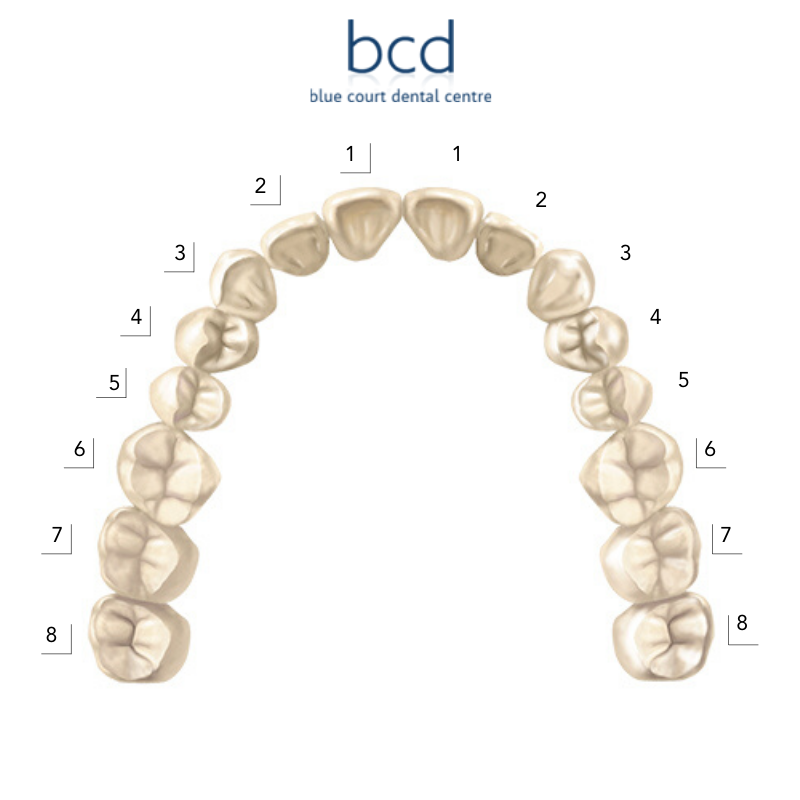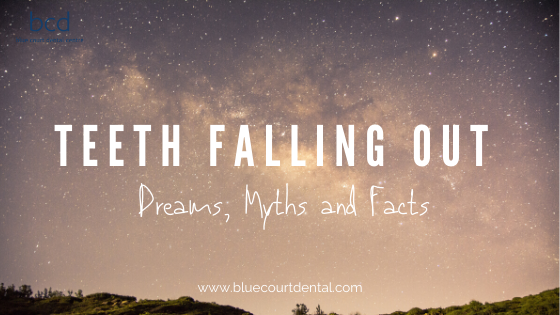So many people have concerns about why teeth fall out, this is often borne out by the number of dreams we have about the topic! In this article we’ll take a look at the myths and facts about what really happens when teeth fall out… We’ll then also have a quick look at dreams!
let’s start by looking at how many teeth do adults have.

Typically an adult will have 32 teeth, 16 on the top (8 each side) and the same on the bottom. The last teeth, labelled 8 in this diagram are the wisdom teeth and not everyone has these teeth come through.
Why do children lose their baby teeth?
The simple answer is down to size. A fully grown adult is much larger than a baby and therefore if the baby teeth were not lost then the teeth would not be big enough to enable the adult to eat adequately, the teeth would simply be too small.
Is it possible to lose baby teeth as an adult?
It is not uncommon for baby teeth to persist through to adult hood. The reason for this is the baby teeth don’t just fall out on their own, it is a process caused by the full-sized adult to growing up pushing through from underneath. If a baby tooth does not come out it was usually mean that the adult tooth underneath is either not present or is coming out in a different place to where it should. If it happens then the baby tooth doesn’t get pushed out.
Baby teeth, contrary to popular opinion, do actually have roots so if they last through to adulthood, whilst they are rather small, they can still be used for eating. The only reason that we don’t see any route when the baby teeth comes out is because it has been absorbed by the body as the adult tooth pushes through from behind.
Which diseases cause teeth to fall out?
There are 2 types of disease which cause teeth to fall out, the first is diseases directly affecting the tooth and/or surrounding tissue, and the second is diseases affecting the body which can affect your oral health.
Diseases directly affecting the tooth and/or surrounding tissue
The disease which will most likely ultimately result in tooth loss if left untreated is periodontitis. This is a severe inflammation of the surrounding bone and tissue is around the tooth. A precursor to periodontitis is the more easily treatable gingivitis. Gingivitis is an inflammation of the soft tissue (gum) which surrounds your tooth. Gingivitis progresses painlessly on the whole until it is in its more latter stages. Early treatment is therefore critical and also easy.
Diseases affecting the body which indirectly affect tooth loss
There are a range of diseases which have been linked in some way to tooth loss. It should however be noted that these are not always causal links (meaning that one disease may not cause the other).
A meta-analysis of a range of studies was conducted in 2009 by Mara Meyer et al, they looked at the relationship between tooth loss and oral , upper gastrointestinal, lung and pancreatic cancers in different populations.
In 3 of their studies they found links between pancreatic cancer and periodontal disease (the disease which leads to loss), however, they did not comment on the exact biological mechanisms involved and so conclusions are still rather difficult to draw.
Diabetes, on the other hand has stronger links. A professor of nursing in global health at Duke University in Durham said in a report published in 2015 that they have more evidence that poor oral health is related to diabetes, with diabetics using approximately twice the number of teeth on average as those without the disease.
Heart disease also has links with tooth loss, although again, the exact connection between the 2 conditions is not fully understood. It is believed that the bacteria present in periodontitis is also present in patients with chronic heart conditions and that this bacteria may be a gateway bacteria for further heart problems.
Can stress cause your teeth to fall out?
Stress, will not directly cause your teeth fall out. However stress can lead to a lowering of the immune system in your body making you more likely to become susceptible to other diseases which may cause tooth loss. Tooth loss can be caused by various cancers, heart disease and diabetes – all of which are exacerbated by excessive stress.
If you are concerned about stress we recommend you take a look at the 10 Stress Busters on the NHS website
Does grinding your teeth cause them to fall out?
Grinding your teeth will cause them to wear down but won’t initially cause them to fall out. However, if you have additional dental diseases which result in loose teeth, such as gingivitis or periodontitis then grinding your teeth can exacerbate these conditions which could ultimately lead to tooth loss.
More information about teeth grinding can be found here, and here.
What can I do if my tooth fell out and now I have a hole?
If you have lost a permanent tooth and have a whole there are 4 options:
- Do nothing. This can, however, result in the teeth either side and opposing the gap to drift, in the long run, this can affect your bite and the way your teeth meet.
- Dentures. Modern dentures can be made to look highly aesthetic although most people don’t like the idea of removable dentures.
- Fixed bridge. A fixed bridge can bridge the gap where the tooth has fallen out, however it does often require preparation/reduction of the teeth either side in order to accept the supporting part of the bridge.
- Implants. Very often these are the most preferred option. Implants act as the replacement tooth root on top of which a new crown (the part of the tooth you see) is made.
Will periodontal disease definitely cause tooth loss?
Untreated periodontal disease will almost certainly cause tooth loss. However, if the periodontal disease is treated then teeth can be saved. It all depends on how advanced the disease is before treatment begins. If you are concerned that you have periodontal disease then we recommend you speak to your dentist as soon as possible. Remember, periodontal disease is the more serious form of gingivitis. Patients with gingivitis will typically have red, puffy or inflamed gums which bleed during flossing or brushing. If this gingivitis is left untreated infection can track down towards the route and cause the more serious periodontitis.
Teeth falling out dream – what does it mean?
So, you have a teeth falling out dream… What does it mean?
We’ve taken a look around the Internet and share with you 11 of the most common ideas about what dreaming of your teeth falling out means.
- Your dream may be associated with loss and important life changes.
- Worried concerned about dealing with stress.
- Major changes in your life are underway and you may be thinking about this.
- Concern about other people losing their teeth, particularly elderly relatives or children.
- You may be grinding your teeth yourself at night and dreaming about your teeth is your brain’s way of letting you know what you’re doing.
- Concerns about personal health. Perhaps you are concerned about your overall health? There may be a reason for this but sometimes it seems people dream about their teeth falling out whilst they are concerned about other health-related issues.
- Inferiority complexes, particularly feeling unattractive. Not many people like the idea of having to smile with no teeth, perhaps dreaming about them falling out is your minds way of reminding you that you have to deal with an inferiority complex?
- Being concerned about your appearance.
- Concerns about ageing.
- Concerns about your diet and what you may or may not be eating.
- Fear or anxiety about visiting the dentist. If this is you then speak to your dentist, let them know you are concerned and they can then take additional measures to help you relax.
Dr Nishan Dixit
Latest posts by Dr Nishan Dixit (see all)
- Dr Dixit is the new President of British Academy of Cosmetic Dentistry - 28 May 2020
- Does Invisalign hurt? - 9 March 2020
- How Long Does Invisalign Take? - 27 February 2020


